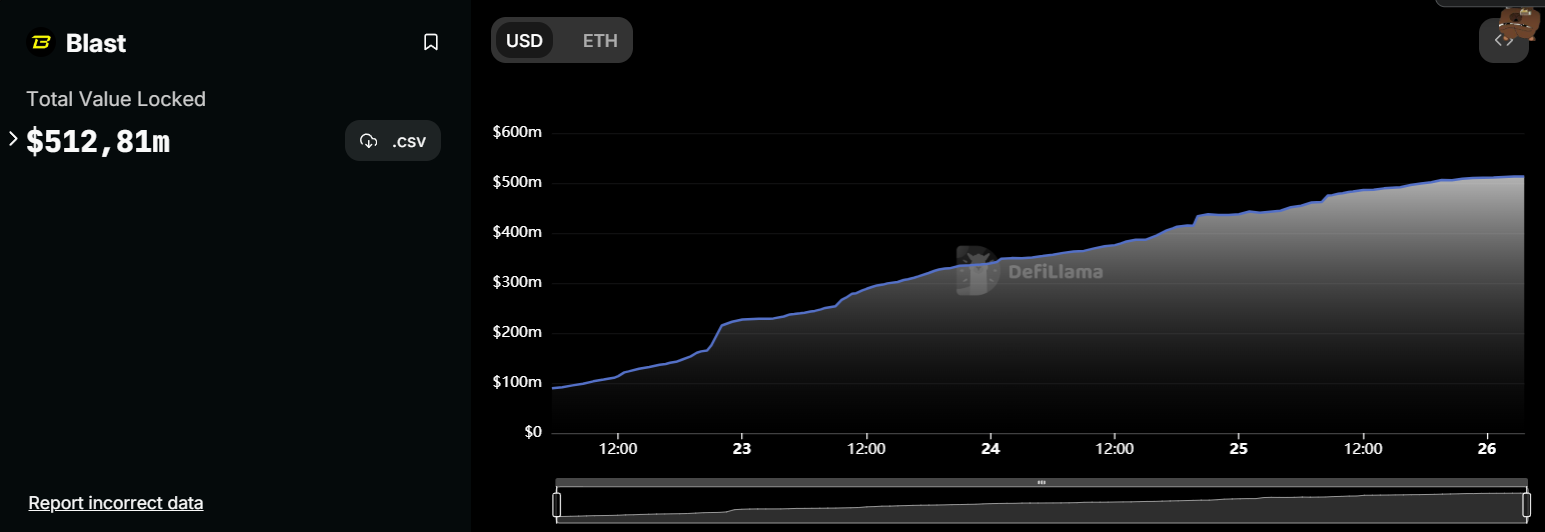While the newest Ethereum (ETH) second-layer platform Blast is growing day by day, some crypto enthusiasts raise concerns about its security, tokenomical design and even the very “L2” status. The Blast team had kept silence for five days, but then explained the benefits of its multi-signature solution.
Ethereum L2 Blast sees $500 million deposited, DefiLlama says
Today, Nov. 26, 2023, Ethereum (ETH) staking platform Blast registered its total value locked (TVL) metric spiking above $500 million in equivalent. By press time, Blast depositors injected over $512,810,000 in its contract, DefiLlama data says.
Launched on Nov. 21, it amassed the first $100 million in less than 24 hours, which makes it arguably the fastest-growing blockchain network by TVL.
As per data of 21 Shares’ dashboard on Dune Analytics (which, unlike DefiLlama, sees Blast’s TVL at “only” $382 million in equivalent), the network managed to surpass Consensys’ Linea, Starknet, Polygon zkEVM, dYdX Chain and is on its way to leaving Coinbase-incubated Base in the dust.
As covered by U.Today previously, Blast promotes itself as the first-ever Ethereum L2 with native yield. It restakes all injected money in Lido Finance and rewards depositors with payouts and Blast Points. Also, Blast stablecoin depositors can benefit from Maker’s tokenized T-bills program.
The protocol yielded $20 million by a clutch of high-reputable VCs, including the likes of Paradigm, Standard Crypto and Primitive Ventures, with the participation of heavy-hitting angel investors Andrew Kang and Santiago Santos.
“Multisigs can be highly effective if used properly”: Blast team dismisses criticism
At the same time, since the launch of its “early access” phase, the protocol has been heavily criticized by the cryptocurrency community for its centralization and Ponzi-like tokenomics.
Some skeptics opined that Blast looks like a single-node sidechain secured by a multi-sig contract instead of being a proper L2.
On Nov. 25, representatives of Blast (which is believed to be founded by Blur NFT marketplace key figurehead Tieshun “Pacman” Roquerre) shared a thread to dismiss the concerns about multi-sig risks.
They stressed that upgradeable contracts protected by multi-sig solutions are much safer than stable contracts. In the case of Blast, the multi-sig is in the right hands:
You want to make sure that each signing key of a multisig is independently secure. This helps make the multisig antifragile. Each key should be in cold storage, managed by an independent party, and geographically separated (…) For Blast, each signer has exactly those properties. They are deeply technical engineers who have experience with high stakes applications ranging from financial applications to smart contracts.
Also, the Blast team teased a security update coming next week: One of the multi-sig addresses hardware wallet provider will be changed.
Credit: Source link




